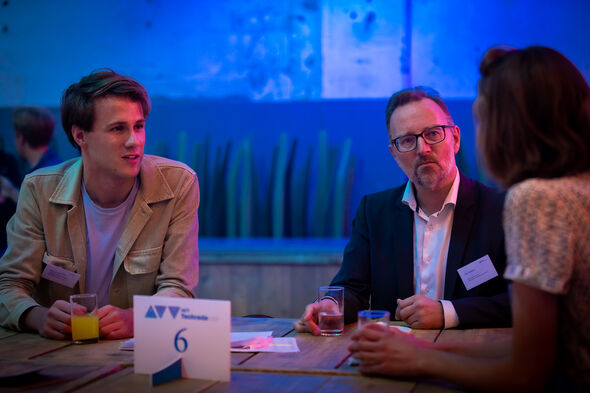In support of tomorrow’s general practitioner
Healthcare is becoming unaffordable, and general practitioners have taken to the streets to protest because they are swamped with work. Something needs to change, and fast. Niels van Herwijnen would gladly like to make his contribution. In his position as 'aanjager' (a driving force) behind technology for the 4TU network, the TU/e master’s student of Biomedical Engineering draws attention to innovative general practitioners, and hopes that this will inspire their colleagues as well as policy makers to adopt a similar, innovative approach.
“A broad social problem like this one differs fundamentally from the specific issues I usually focus on,” says Van Herwijnen, who studies for the master’s program Bio-organic Chemistry, “but I’m also interested in the management aspect of healthcare.” That’s how he ended up with the Driving Force behind Technology, “It's a kind of student team within the 4TU alliance. We organize, among other things, the annual Techrede, an alternative Throne Speech” The student team focuses on five societal issues with a link to technology: agriculture, circular economy, digital security, energy and healthcare. Van Herwijnen opted for the latter issue.
Comes at a price
General practitioners have been sounding the alarm for quite some time now, because they are swamped with a huge number of healthcare and administrative tasks. And in the long-term, the Dutch healthcare system simply isn’t sustainable, Van Herwijnen says. “If we continue down the familiar road, we will have to pay 16,000 euros per person annually forty years from now. That’s the result of an ageing population on the one hand, and an increase in the number of available medical treatments on the other hand – the number of treatments continues to increase, but that comes at a price.”
But what can someone like him, a student, do to help solve such a major social problem? “We can try and make as much impact as possible. We try to do so by talking to innovative general practitioners, and we then present others with these cases to inspire them. We contribute to a podcast series about innovative general care, and we’ve taken part in the Dutch Health Week. In addition, several articles have appeared on the Public Health website.”
Small scale
Van Herwijnen deeply admires general practitioners who have taken it upon themselves, despite the high work pressure, to improve healthcare by innovating on a small scale. “We talked to GPs who innovate in three areas: online general care, substantive collaboration and prevention.”
The online general practitioners are based at several locations, including Utrecht. “They are located in places where the target groups that likes to make use of their services – such as students and expats – are well represented, but also in regions that have a shortage of general practitioners.” As a general rule, consults take place online whenever possible.
In the south of Limburg, no fewer than 86 practices work together closely, Van Herwijnen says. They each have their own specialty and they refer patients among their own practices. “In addition, they combine their data and analyze that data in order to improve the quality of healthcare.”
Prevention
And then there are the general practitioners – based in Leiden – who deliberately focus on preventive care. People who feel stressed can have their schedules checked by their GPs, who prefer to provide life style advice instead of medication. It’s healthier for patients, and it helps makes healthcare more affordable. Unfortunately, however, the development of preventive care is being thwarted by current policy, Van Herwijnen says.
“All the financing goes to curative care; it’s practically impossible to find funding for projects that focus on preventive care. And the few funding pots that are available require much administrative work – and general practitioners have more than enough administrative tasks as it is.”
This is one of the issues that Van Herwijnen would like to draw attention to. “We are scheduled to meet with the umbrella organization of Dutch health insurance agencies shortly. And something needs to change in The Hague as well.” He likes acting as a mediator. “Kicking and being uncooperative isn’t in my nature. I prefer to meet with people and to adopt a constructive, unifying role. It’s nice that we we’re backed by four universities and that we bring their gravitas to the table; people listen to us, even though we are ‘merely’ students.”
Van Herwijnen and his team mates will conclude their year as driving force at the end of the month, with the Techrede 2022.
![[Translate to English:]](/fileadmin/_processed_/d/0/csm_huisarts_shutterstock_52ba67e9f0.jpg)


Discussion